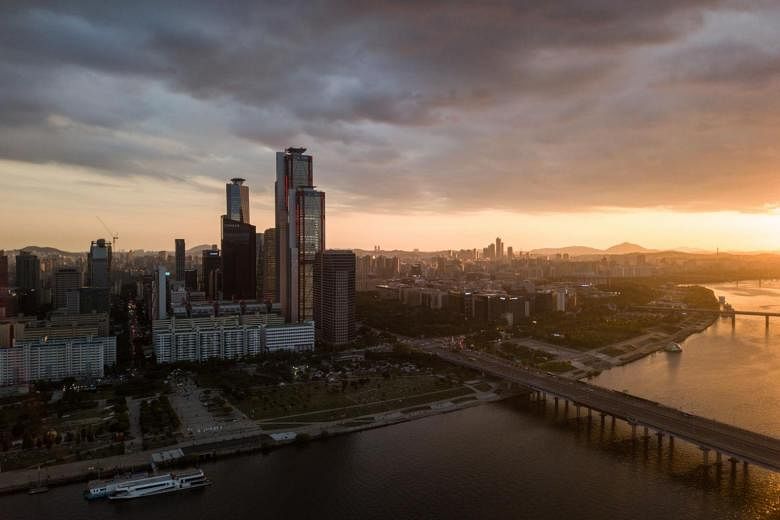SEOUL - Technologically advanced South Korea may be home to IT giants such as Samsung and LG but the country is still an "ugly duckling" waiting to blossom when it comes to its start-up scene, according to Israeli venture capital firm Yozma Group.
The firm set up base in Seoul in 2015 after South Korea impressed it with tech advancements that were ahead of global trends.
South Korean social networking platform Cyworld, for one, took the country by storm before Facebook swept the world.
Home-grown video-sharing site Pandora TV was founded before YouTube, while local Internet phone service Dialpad was famous before Skype.
"All of these services and products are currently dominated by United States companies but came from Korea first," said Mr Chris Hwang, president of Yozma Group Korea.
"Even Naver launched a year before Google," he added, referring to the two Web portals-turned-tech giants.
So why didn't the South Korean innovations go global like their American rivals?
The problem, Mr Hwang said, lies in the Korean firms' obsession over the local market - home to a population of 50 million - and lack of resources to seek global commercialisation.
He cited the example of South Korea's mobile navigation app Kim Gisa (literally Driver Kim), which he said was "superior" to Israeli equivalent Waze but valued at a mere fraction of Waze's price.
Google acquired Waze for a staggering 1.2 trillion won (S$1.39 billion) in 2013, whereas Kim Gisa was sold to South Korean Internet firm Kakao for 65 billion won in 2016.
"Korea is metaphorically the 'ugly duckling'," Mr Hwang told The Straits Times.
"It has the potential to blossom into a swan in the global market, yet it generally lacks the initial uplift for it to blossom."
There are more than 100,000 tech start-ups in South Korea, including 11 unicorns which are worth over US$ 1 billion (S$1.39 billion) each, such as e-commerce giant Coupang, food delivery company Woowa Brothers and fintech firm Viva Republica.
But only 500 start-ups have gone global on government funding since 2011, according to official data.
This is where Yozma, which has managed more than US$4 billion worth of venture funds since its founding in Tel Aviv in 1993, and now has offices in Singapore and Hong Kong, can help.
Mr Hwang said they are able to invest in good Korean tech start-ups and help them go global, while at the same time "matchmake" South Korea's manufacturing prowess with Israeli firms seeking to commercialise their tech products and services.
Yozma's Korean arm has already invested 70 billion won over the last two years, mostly in Korean biotech companies, while running the Yozma Campus to groom Korean start-ups and working with the Weizmann Institute of Technology in Israel to create a multi-national platform for collaboration.
"Present-day Korea is similar to Israel in the 1990s," said Mr Hwang. "The country has excellent technical capabilities and local talent. Korea is the leading country for research and development (R&D) but the products are rarely commercialised overseas.
"Back in the 1990s, when Israel finally commercialised their R&D technology, the profit was enormous. History often repeats itself, so I hope to see that happen again, this time with South Korea."
Nicknamed "Start-up Nation", Israel is home to some 6,500 start-ups - the highest per capita figure in the world, given its small population of 9.2 million.
Israelis have founded some 30 unicorns and their tech firms raised a record-high US$8.3 billion in 522 deals last year, mostly from foreign investors.
Mr Hwang noted that Israeli tech companies have traditionally outsourced manufacturing to the US and Europe, but "South Korea is arguably the better partner" given a global shift to Asia.
Discussions with Korean venture companies, research institutes and universities show "great potential", he added.
Yozma has already invested in South Korean biopharmaceutical firm BioLeaders with plans to help the drug-discovery company incorporate technology from Israel.
The venture capitalist is also on a lookout for Korean partners for Israeli tech firm Salamandra Zone, which is seeking to commercialise a new air purification technology that can kill viruses.
Meanwhile, Yozma-invested Israeli medical imaging firm Nanox has just announced a second round of investments worth US$20 million from South Korean telco SK Telecom last month, bringing the total to US$25 million, and there are plans to build a factory in South Korea to produce semiconductor chips for Nanox's digital X-ray devices.
Moving forward, Mr Hwang said South Korea needs to join forces with Israel to expand its presence in emerging markets such as South-east Asia, India and the Middle East.
He views Singapore as a "gateway to gain traction in Asia", where its start-up hub offers access to international funding, skilled manpower, and a global network.
Yozma's Singapore office was set up in 2018 and Mr Hwang had intended to relocate to the city state, though his plans were derailed by the coronavirus pandemic.
"The Yozma Group aims to expand its previous success on a global scale by proactively facilitating cross-border investments in Israel, Korea, and Singapore through discovering and fostering promising start-ups in each space," he said.
His advice to South Korean start-ups wanting to go global?
"Just go!" he said with a laugh.
"You can't find a solution without looking for it. If you fail, go again. There's no U-turn."


